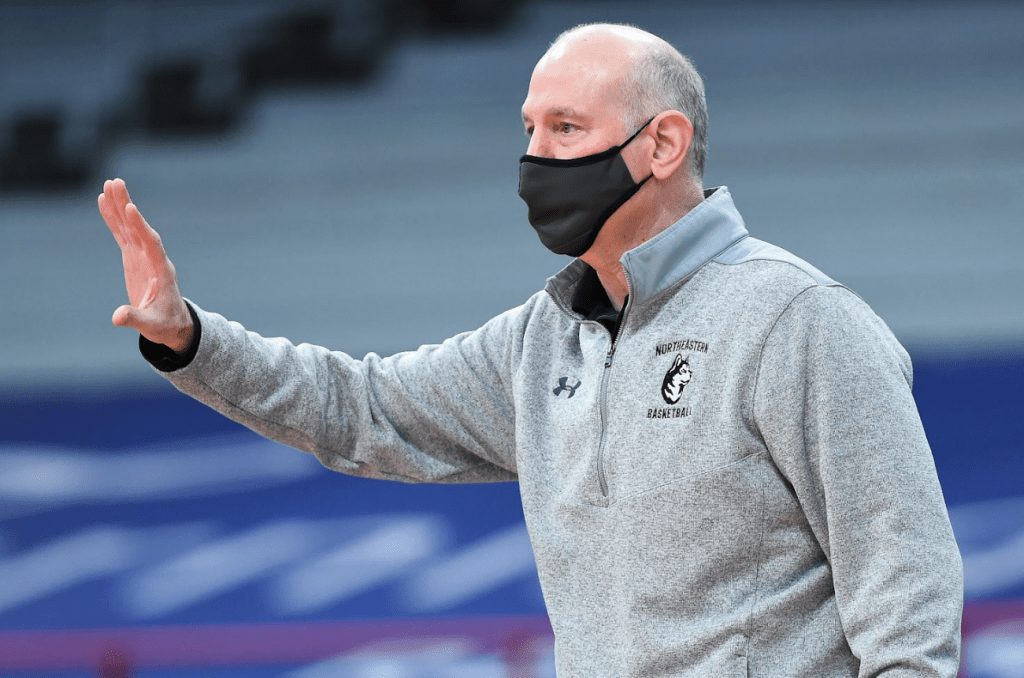By Milton Posner
Jake Egelberg contributed reporting for this story.
As Bill Coen breaks a wins record leftover from Northeastern basketball’s “Golden Era,” players and coaches past and present reflect on the coach and his legacy.
On March 7, as the buzzer expired and the Northeastern men’s basketball team completed a comeback CAA Tournament win, it also secured a program record for head coach Bill Coen, who edged past Jim Calhoun’s 35-year-old mark with his 251st victory.
Sophomore guard Tyson Walker said they’d wanted to win it for him. In the locker room, the players erupted into a shout, leapt up and down, and poured water over the 15-year coaching vet. Coen wiped the water off his head and face mask, threw his hands skyward, and … talked only about the team’s resilience.
On the postgame presser, Coen extolled Calhoun’s résumé and credited the wins to his assistant coaches, the university, medical and support staff, and his players – the same answer he’d been giving for almost two months. “Coaches get way too much credit,” he noted. “I haven’t scored a basket or grabbed a rebound in a long time. These guys do all the work.”
“Everybody around the program – assistant coaches, players – we all were very aware of 251,” assistant coach Brian McDonald admitted later. “Coach Coen, on the other hand – that was probably the last thing he was thinking about. And he’ll deflect any kind of credit at any opportunity. He’s the last one to ever want to talk about himself.”
The Beginning
“As a kid, you remember your really, really great teachers, but you remember every one of your coaches,” Coen said. “When people show you that type of concern and care in your own development, it attracts you to the profession.”
For Coen, no one was as prominent as Tom Murphy, who coached him at Hamilton College and has been on Coen’s Northeastern staff every step of the way.
“Since I was 17 years old, I never made a big decision in my life where I didn’t at least ask him what he thought,” Coen said. “Most guys, when they go to college, hope to have a meaningful relationship with their head coach. Very few get that in four years. I hit the grand slam because I got a lifetime relationship.”
“He learned a lot or most of the things he does from Murphy,” Matt Janning, who played at Northeastern from 2006 to 2010 and became the most prolific scorer of the Coen era, said. “You see the resemblance, you see the care Murphy gives to all the players too. Coen has the same thing about him.”
For Janning, that care made a difference when he trekked to Boston to meet Coen.
“Having my dad there and him meeting Coach Coen, I think that was the ultimate ‘okay’ for me to go from Minnesota to Boston,” he said. “It was them knowing I’d be with Coach Coen, it was like a father figure away from home.”
Quincy Ford, who notched two all-conference team appearances and led the Huskies in their 2015 CAA title game win, got the same vibe.
“It was an organic connection,” Ford remembered. “The things he told me were things I needed to hear about my development, how he sees me, how he sees me in the future and what I could do for the program. That was the biggest thing that attracted me. I remember telling my mom, ‘This is where I need to be.’”
“I thought he was extremely honest, wasn’t trying to upsell me,” former Husky forward and current assistant coach Manny Adako said. “A lot of coaches try to upsell you, tell you they’ll make you this or make you that, just to try to get you on campus. It was refreshing to have an honest recruiting process with Coach.”
But that wasn’t the only thing that stood out to Adako.
“Coaches are constantly calling you, and they love to see who you were getting recruited by,” he explained. “You give them a school and they’ll throw some dirt, some offhand, backhanded comments. But every time you bring up Coach Coen, they either couldn’t say a bad thing about him or they had a compliment. If someone’s in competition with you and all they can do is give you a compliment, that says a lot.”

The Strategy
When Coen took the reins in 2006, it was tricky to know exactly what he was getting into. The Huskies were entering just their second year in the Colonial Athletic Association, and JJ Barea, the second-leading scorer in program history, had just signed with the Dallas Mavericks. And, as former assistant coach and fellow Hamilton alum Jim McCarthy points out, Coen was a first-time coach in a conference that wasn’t exactly teeming with them. He had to build.
“He had come from Boston College where they ran a flex offense, a lot of size,” McCarthy said. “In our first couple recruiting classes, we had a lot of size and multidimensional players with less emphasis on the three.”
Coen said he used the BC staple as “more of a game-control offense when we got a good lead.” McDonald emphasized the two-big, slow paced, defensively stingy approach, which his teammate Adako attributes partly to the longer shot clock of that era.
But you don’t succeed at this level by playing the same system for a decade and a half.
“We spend a lot of time in the summer watching NBA film, watching high-level European basketball, trying to get an idea of where the game is going,” McDonald said. “Now, in contrast, we play a four-out or five-out, ball-screen-heavy offense.”
Adako added that all five positions have become more skilled, and everyone must “create, pass, dribble, and make good reads in a shorter period of time.” But the change wasn’t just about winning.
“The analytics, the spacing, the three-point shot — future professional opportunities are looking for certain skills and understandings and structures.” Coen said. “We felt we had to change with the times and play a little bit more of a modern game because it was more suitable for the guys who were coming up. It would give them the best opportunity, once they left our program, to continue playing professionally.”
More than 20 of his players have, and those players have fueled Coen’s run to two CAA Championships and the second-highest win total in conference history. But that isn’t his only goal.
Many college coaches laud the university ethos and the life lessons their program instills. Doubly so for someone like Coen whose university touts its co-op program as evidence of its commitment to employment. They aren’t clichés for him. He wants bigger things for his athletes.

The Legacy
On February 15, 2020, Northeastern held Charleston scoreless for ten straight minutes in the second half to earn the sort of aggressive, hard-fought win any coach would love.
But after the game, Coen’s mind was elsewhere. Larry Kollath, an All-American college teammate Coen called “an all-universe human being,” had passed away.
“In the short term, we’re all about trying to win basketball games,” he said. “In the long term, we’re trying to create unbreakable bonds between teammates, coaches, staff, relationships that last a lifetime … that someday, when adversity hits their lives, their teammates are there by their side.”
This is a hard thing to measure, but his players said he succeeded.
“Pros that come back,” Adako said, citing Jared Dudley from Coen’s BC days, “they hunt Coach down to come sit in his office. That shows you the kind of relationships he builds with his players and the respect they have for him.”
McDonald cited a lively group chat including himself, Adako, and about 20 other players spanning a decade of Northeastern basketball. “Those guys were just as excited to see that Coach Coen broke the record,” he said.
Ford added that “the wins are cool, going to the tournament is cool, but the fact that I could call him right now and everything would be all good, I can call any of those guys and everything would be perfectly fine.”
It’s the product of the sort of longevity that only a certain kind of dedication can foster.
“He loves Boston; I don’t think he’s moved in 25 years or something, which is crazy for a college coach,” McCarthy noted. “He likes to build. He’s not someone who goes somewhere every two years and takes recruits with him.”
And they all returned to the same two points, the two points that say everything: how impressive the record is and how little it matters to Coen.
“Every day he was working for others; nothing he does is for himself,” Janning said. “He probably didn’t even know about these records that he’s setting. Honestly, he probably doesn’t care … He’s more interested in turning out good people, good basketball players. That’s satisfaction enough for him.”
“Big-time congratulations,” Ford added. “He deserves everything.”

